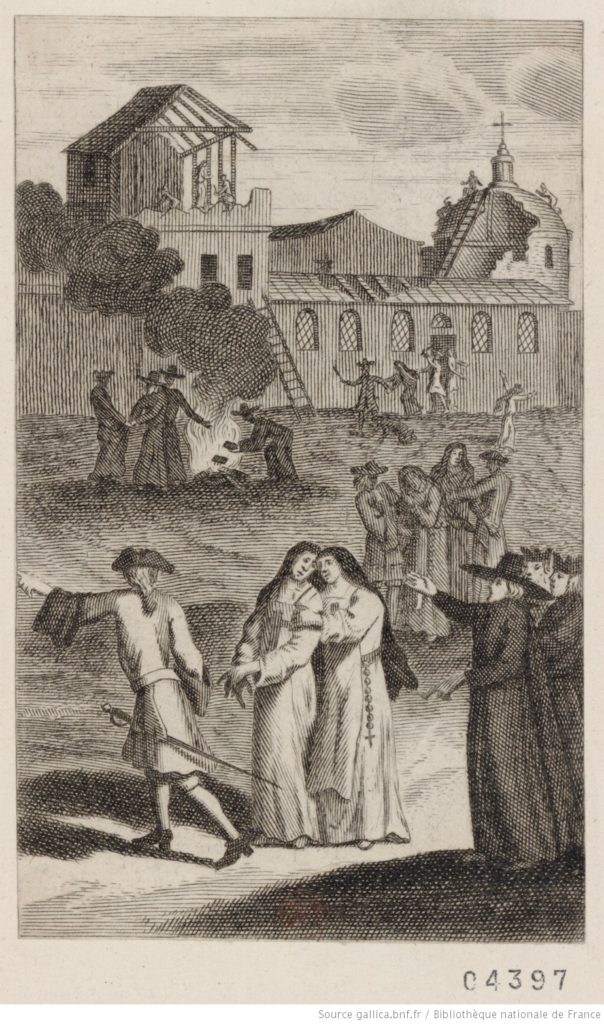Beatrice Barr was awarded the Society for the Study of French History’s 2022 Undergraduate Dissertation Prize for a dissertation entitled ‘Revolutionaries, Feminists, Martyrs? Revisiting the image of the Religieuses Hospitalières in pre-revolutionary France’. She wrote the dissertation while studying at the University of Oxford, and in this blog post she introduces her research:

My undergraduate dissertation, ‘Revolutionaries, Feminists, Martyrs? Revisiting the image of the Religieuses Hospitalières in pre- revolutionary France,’ considers a convent of 30 Jansenist nuns (the Religeuses Hospitaliéres de la Miséricorde de Jesus) in the Faubourg Saint-Marcel in 18th century Paris. In 1756, when Jansenist debates had become explicitly political, these nuns sought to defend their practice against the condemnation of the archbishop, Christophe de Beaumont, and the papal bull Unigenitus. In doing so, they corresponded with leading Jansenist parlementaires, who in turn fought their case in the Paris parlement and contemporary writings. My research explores how far these nuns were complicit, even engaged, in their political presentation, and what this says about eighteenth-century Jansenism, church-state relations, and the role of female religious communities in them.
French Jansenism is typically closely associated with the abbey of Port-Royal des Champs, in the late 17th and early 18th centuries. There, nuns exiled from Port-Royal’s Paris site defended Jansenist practice under the supervision of the abbess Angélique Arnauld – sister of Antoine, the leading Jansenist theologian. The forced dissolution of that community in 1709 commands the attention of the majority of scholarship on the subject: from Augustine Saint-Beuve’s classic three-volume historiography to Dale Van Kley and Daniella Kostroun’s recent work.
Mita Choudhury has written about the image and significance of Jansenist nuns and, indeed, invited further research into nuns’ own correspondence. Yet little has been written on female religious communities outside Port-Royal. This surprised me when reading about the topic, as the significance of Port-Royal seemed to lead naturally to explorations of their broader role in such theologically- and politically-significant debates. Thanks to the Bibliothèque de la Société de Port-Royal in Paris, however, plenty of material exists on other Jansenist convents; in particular, their correspondence with prominent Jansenist political actors. This was the starting point for my research.

My dissertation ultimately contrasted the public presentation of the Religieuses Hospitalières of the Faubourg Saint-Marcel – by both their supporters and detractors – with their private correspondence. I found the former in the Archbishop’s ‘Monition’ threatening the nuns’ excommunication and in the Lettres sur le Péché Imaginaire by Louis-Adrien le Paige (a prominent Jansenist parlementaire), as well as in several issues of the preeminent contemporary Jansenist journal, Nouvelles Ecclésiastiques. The latter came from the nuns’ private correspondence with the prominent Jansenists who provided moral and political support for them – Le Paige and others.
What these sources revealed was a complex relationship between the Hospitalières and their public image. Both the Archbishop – who sought to force them to condemn Jansenist teaching – and prominent Jansenists – who made their case in public – portrayed them as suffering, pious, and helpless. The nuns’ engagement with the political sphere demonstrates that this was not the case – yet they were not straightforwardly political, either. Even as the Jansenist cause transformed in public from a primarily-theological to a primarily-political issue, their religious commitment remained the driving force of their private correspondence. But, at the same time, they showed a remarkable appreciation of the necessity of political action for success in their dispute with the Archbishop. They were deeply committed religious women, aware of the need to use the political sphere.
Conducting archival research in 2021 posed familiar challenges. The Bibliothèque de la Société de Port-Royal, which houses the letters between the Hospitalières and Le Paige, was closed, not due to Covid, but for refurbishment, throughout my research period. Their generous archivist was, however, able to send me a number of sources by email. Other primary sources were housed in the BnF in Paris, to which I was able to travel (hours before France closed its borders to British travelers in December 2021) thanks to a generous travel grant from my college, St Peter’s.
Evidently, my focus was narrow. But my thirty nuns illuminated something, I hope, about the character of 18th century French Jansenism and women’s participation in it. There was a world of engaged Jansenist religious women outside of Port-Royal, years after its dissolution, whose contributions complicate assumptions about what 18th Century church-state politics looked like.
I am extremely grateful for the SSFS for this award and to my supervisor, Dr Will Clement, for his support throughout the dissertation process!
For more about Beatrice’s award see : https://frenchhistorysociety.co.uk/dissertation_winners.htm


